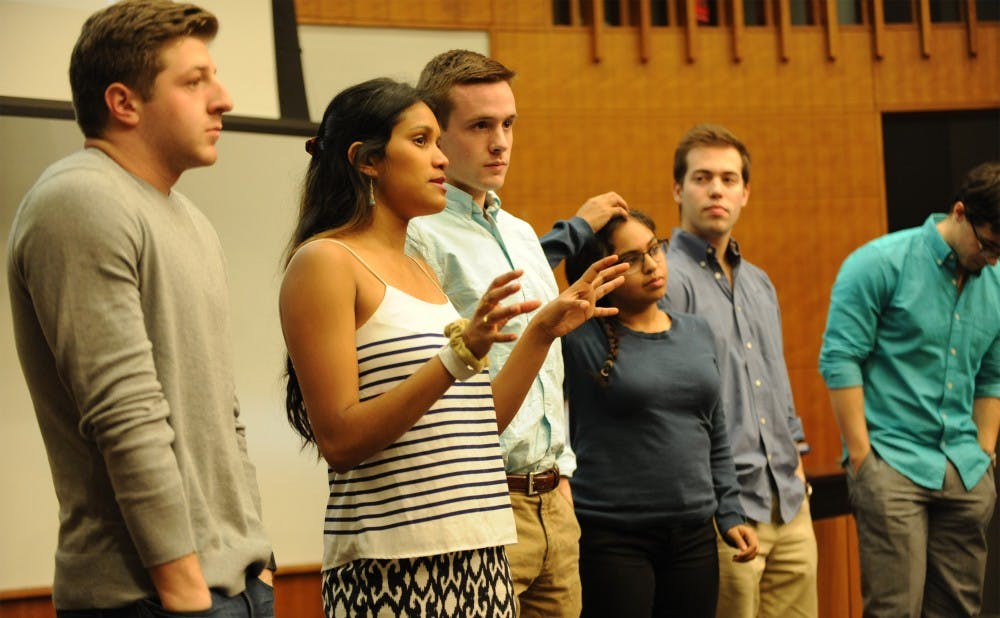The Duke Student Government Senate passed a resolution to counter the administration’s newly enforced quota guidelines for selective living groups.
In a meeting Wednesday, the Senate passed a resolution stating that DSG supports housing requirements based on the number of group executives living in section and meeting Residential Group Assessment Committee requirements. The resolution, written by President Lavanya Sunder, a junior, and Vice President for Residential Life Zach Gorwitz, a sophomore, is meant to counter the administration’s proposal which says that 30 percent of a selective group’s section must be composed of upperclassmen.
Gorwitz explained that he expects administration to consider and be willing to negotiate over the new resolution.
“We expect the administration to be receptive to our proposal,” he said. “We took their considerations of community and good conduct into account, and tried to put together a counterproposal that ensured [those things] would exist, but in a way that was more conducive to how living groups currently operate on campus.”
The resolution states that groups should be able to avoid the housing requirements by having three out of seven members of a group’s executive board live in section. The executive board would be defined as the president, vice president, treasurer, secretary, historian, new member chair and standards chair. This move is intended to address administration’s concerns about a lack of community and concerns about poor conduct among younger members of groups.
In order to bypass administrative requirements, groups will also have to meet RGAC requirements, which are organized in a quota-point system. A minimum of 80 out of 100 points must be earned—30 points can be awarded based on minimal damages to facilities, 20 points are awarded for holding at least two community service events per semester, 20 points are awarded for holding public events, 15 points are awarded for holding a faculty-related event and maximum of 15 points will be awarded for conduct. In addition, groups can earn an additional 10 points for electing and training an identity representative.
Group punishment is also addressed in the proposal. The administration guidelines, which currently state that if a group fails to reach the quota in two out of three years, that group will be removed from campus. The DSG resolution proposes a more holistic look at groups who are facing discipline in front of the Approval and Removal Committee, which is responsible for selective living group discipline. Under the resolution, groups which are exemplary in every regard but fall one senior short of the quota would likely not be kicked off of campus but would face a smaller punishment, such as the docking of funds.
The Senate also passed a budgetary statute allocating around $6,000 for an off-campus bus service which will run to different locations around Durham on weekends. The service, which will run two buses to places like downtown and Southpoint Mall, was proposed by senators for Durham and regional affairs Jessica Reese, a junior, and Gwen Geng, a freshman.
“I was talking to some of my friends and peers about our lack of transportation,” explained Reese. “It’s kind of a cumbersome process to go through WeCar and figure out who pays for what, and I noticed how much was left in the surplus [fund] and I wanted to do something for students with that money.”
The service has been approved by Parking and Transportation Services and is integrated with the TransLoc transit tracking app.
In other business:
Student Organization Funding Committee approved several group funding requests—$4,750 for the Students of the Caribbean Association and their Caribana cultural festival; $3,540 for the Marine Science and Conservation Leaders group, which is leading an open field trip to the Duke Marine Laboratory in Beaufort, N.C.; $5,176.02 for the Lambda Upsilon Lambda Fraternity, which is holding a dinner for Latino Student Recruitment Weekend at the Washington Duke Inn; $6,635 for the Duke Jewish Student Union, which is holding an open bar-mitzvah for a student who has never had one; $2,088.25 for the Korean Undergraduate Student Association, which is holding a Korean arts showcase; $16,875 for duARTS, which is holding a convention for Duke grads involved in the arts, including a gala at the Penn Pavilion; $2,144 for Defining Movement’s spring dance showcase; $3,375 for Blue Devils United’s Lavender Ball, an open formal for the LGBTQ community; and $4,554 for the Asian Student Association, which is holding a social awareness workshop and a storytelling and poetry performance.
SOFC also approved the creation of two new groups: Duke Le Bump, which is for bumper pool enthusiasts, and Duke Smash, which is for Super Smash Brother video game enthusiasts.
The Senate passed an environmental resolution against the University’s use of neonicotinoids, a pesticide which poses risk to both the environment and student health. The resolution was introduced by senator of equity and outreach John Guarco, a sophomore, and senator of facilities and environment Jared Katzen, a freshman.
The Senate also passed a resolution condemning the murders of Yusor Mohammad Abu-Salha, Deah Shaddy Barakat and Razan Mohammad Abu-Salha. The resolution also urged the investigation to proceed responsibly and with justice and expressed support for the Chapel Hill community. The resolution was proposed by Guarco and senator of equity and outreach Madhav Dutt, a freshman.
A bench-burning statute was passed to withdraw $1,500 from the surplus fund for the reconstruction of benches burned after the men’s basketball team’s victory over the University of North Carolina on Wednesday, Feb. 18. The statute was proposed by Gorwitz and Vice President of Social Culture Tucker Albert, a junior.
The Senate passed a statute to allocate $720 to a Duke Vans service which will run to a nearby pharmacy on weekends. The statute was introduced by Vice President for Services Billy Silk, a junior, and senator for services Priyanka Venkannagari, a sophomore.
Get The Chronicle straight to your inbox
Signup for our weekly newsletter. Cancel at any time.

